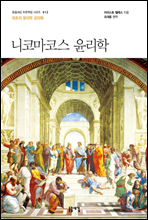책소개
<니코마코스 윤리학> 영문판.
윤리에 관한 아리스토텔레스의 철학이 담긴 책으로 전10권으로 구성되어 있다. 리케이온 학원 강의노트를 바탕으로 저술하였으며, 아리스토텔레스의 아들 ‘니코마코스’에게 바치는 형식이거나 그에 의해 편집된 것으로 보인다. <니코마코스 윤리학>은 도덕적 행동의 습관화를 통해 도덕적 성품을 고양하는 것에 초점을 두며, 에우다이모니아(Eudaimonia: 좋은 삶, 행복한 삶)를 삶의 목표로 보고 있다.
목차
Book One
1. Good as an End
2. Good for Society
3. Knowledge of the Good
4. First Principles
5. Types of Life
6. Good Itself
7. Good for Something else
8. Virtue and Happiness
9. Source of Virtue
10. Defining Happiness
11. Happiness Depends on Happiness of Others
12. Happiness as Activity of Soul
13. Kinds of Virtue
Book Two
1. Exercising Virtue
2. Nature of Right Action
3. Pleasure and Pain
4. How Virtuous Acts Must Be Done
5. Virtues Are States of Character
6. Virtue Concerned with Mean Action
7. Particulars of Mean Action
8. Three Kinds of Disposition
9. Erring on Side of Lesser Evil
Book Three
1. Virtue Not Action under Compulsion or Ignorance
2. Virtue Involves Choice, Based on Rational Principle and Thought
3. Thought Must Be about Available Means
4. Pleasure and Pain Affect Perception of What Is good
5. Extent of Responsibility
6. Virtuous Fear and Fearlessness
7. Courage and Rational Fear
8. Five Things Sometimes Called Courage
9. Courage as Endurance of Pain
10. Intemperence Involves Bodily Pleasures, But Not All of Them
11. Temperance Involves Moderate Appetites
12. Temperance Involves Rational Principle
Book Four
1. Liberality
2. Magnificence
3. Pride
4. Honour
5. Good Temper
6. Flattery and Churlishness
7. Boastfullness
8. Tact
9. Shame
Book Five
1. Justice and Injustice
2. More than One kind of Justice
3. Justice is Proportion
4. The Rectificatory
5. Reciprocity
6. Justice in Different Spheres
7. Political Justice
8. Voluntary and Involuntary Acts
9. Suffering Injustice
10. Equity and the Equitable
11. Can a Man Treat Himself Unjustly?
Book Six
1. The Dictates of the Right Rule
2. Sensation, Reason and Desire
3. Scientific Knowledge
4. Art
5. Practical Wisdom
6. Scientific Knowledge
7. Wisdom
8. Political Wisdom and Practical Wisdom
9. Inquiry and Deliberation
10. Understanding
11. Judgement
12. Philosophic and Practical Wisdom
13. Natural Virtue and Virtue in the Strict Sense
Book Seven
1. Three Kinds of Moral States to Be Avoided
2. Incontinence and Continence
3. Whether Incontinent People Act Knowingly or Not
4. Is There Any One Who Is Incontinent without Qualification
5. Self Indulgence and Temperance
6. Incontinence in Respect of Anger
7. Pleasures and Pains and Appetites and Aversions
8. The Self-Indulgent Man
9. Some Who Fail to Abide by Their Resolutions
10. Practical Wisdom Not by Knowing Only but also Acting
11. The Study of Pleasure and Pain
12. Two Kinds of Good
13. All Things, Both Brutes and Men, Pursue Pleasure
14. Bodily Pleasures
Book Eight
1. Friendship
2. Not Everything Seems to Be Loved but only the Lovable
3. Three Kinds of Friendship
4. Perfect Friendship
5. The Friendship of the Good
6. Sour and Elderly People
7. Inequality Between the Parties
8. The Wish to Be Loved
9. Friendship and Justice
10. Three Kinds of Constitution
11. The Constitutions, Friendship and Justice
12. Association
13. Utility
14. Superiority
Book Nine
1. Friendships Between Dissimilars
2. Preference
3. Breaking off a Friendships
4. Man's Relations to Himself
5. Goodwill Is a Friendly Sort of Relation
6. Unanimity
7. Benefactors
8. Should a Man Love Himself Most?
9. Does a Happy Man Need Friends?
10. Should We Make as Many Friends as Possible?
11. Do We Need Friends More in Good Fortune or in Bad?
12. Living Together
Book Ten
1. Pleasure
2. Pleasure, Pain, Good and Evil
3. Is Pleasure a Quality?
4. Pleasure Is Whole
5. Different Kinds of Pleasure
6. Happiness
7. Happiness and Virtue
8. Perfect Happiness is a Contemplative Activity
9. Encouraging Virtue










